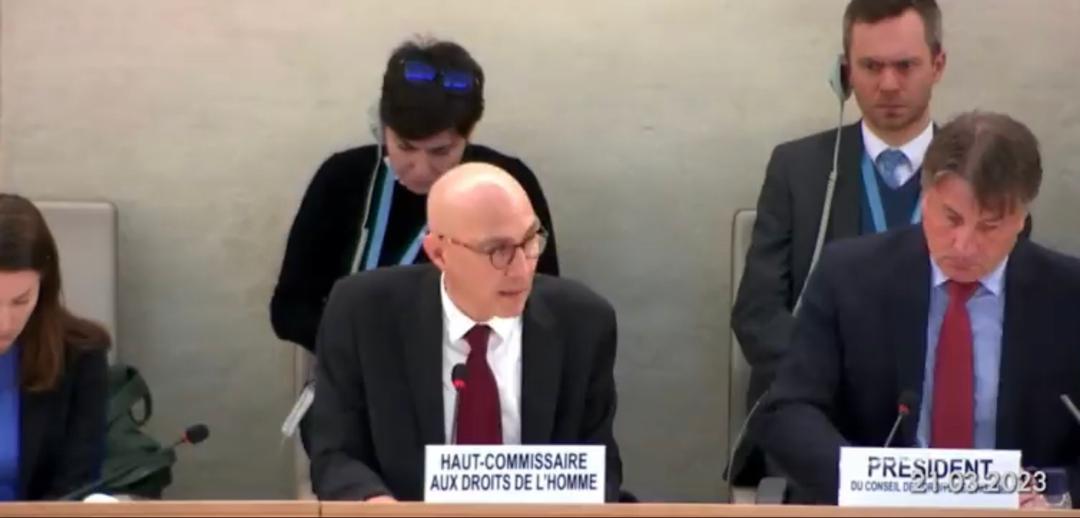
Concerns and observations of the United Nations High Commissioner for Human Rights, Volker Türk, on the situation in Venezuela in his first oral intervention to the Human Rights Council
HumVenezuela | March 21, 2023
Systematic power cuts, lack of water, lack of access to food, and in general, lack of guarantees for human rights in the civil, political, economic and social spheres, as well as humanitarian needs in general, are issues highlighted by Volker Türk, High Commissioner for Human Rights at the Interactive Dialogue on Venezuela, which was held in Geneva this March 21, 2023.
“I met people who told me about their daily struggle to survive. They told me of regular power cuts, of the lack of running water, of the unavailability of medicines and food, of how they were falling deeper into debt. And they spoke of the direct mental health impacts of all these challenges, with many suffering from anxiety and depression”. Pointing out that, according to UN statistics, there are more than seven million people in need of humanitarian assistance in Venezuela.
Held during the 52nd regular session of the United Nations Human Rights Council, this first meeting held in 2023, based on the documentation that the OHCHR has been developing since 2019 in Venezuela. And this session is not only important because of the role of the High Commissioner but also because of the participation of member states of the Council and Venezuelan civil society organizations.
Türk expressed great concern over the ” bill to further regulate NGOs”, an issue that constricts the already restricted civic space in Venezuela. ” provided detailed observations on this issue to the authorities and I repeat my call for any legislation to be in line with international human rights standards”, he said.
“Human rights defenders and journalists continue to face attacks, intimidation, and criminalisation. For instance, six union and labour leaders have now been detained for over nine months on charges of conspiracy and criminal association”.
Paraguay and other countries also expressed concern about restrictions on civic space, “especially in light of the upcoming presidential elections and in particular the approval of the new NGO law”.
Türk advocated for the integrity of indigenous populations, who are currently vulnerable to mining activities, and the need for them to be protected in accordance with international human rights standards. Massacres in mining towns; forced disappearances; assassination of indigenous leaders; labor exploitation of adults and children; forced prostitution; contamination of water, soil and air; and the proliferation of diseases such as malaria have indeed been documented by civil organizations in mining areas.
Farmers and peasants, according to Türk, have had to demonstrate to defend their right to land: “My team has received reports of them being harassed and killed by unidentified individuals”, he said. Despite indications of “a slight improvement in the economic aspect,” peaceful demonstrations for better living conditions, jobs and wages have increased in the country.
Amid this enumeration of “human rights challenges” Türk referred to “signs of economic recovery” that “bring some hope,” but not without warning that any policy to support economic growth must have human rights at the center, with free, transparent and equitable access to data and information of public interest.
The UN High Commissioner for Human Rights denounced that human rights defenders and journalists continue to suffer attacks and criminalization in Venezuela and called on the authorities for another dialogue: with victims and with civil society. “The UN High Commissioner for Human Rights denounced that human rights defenders and journalists continue to suffer attacks and criminalization in Venezuela and called on the authorities for another dialogue: with victims and with civil society. “I hope that justice is rendered for the victims, the victims deserve guarantees of non-repetition”:
Türk urged the lifting of sectoral sanctions – not personal sanctions – which “have exacerbated pre-existing challenges and deepened people’s daily struggle”. He spoke of “all parties” needing to reflect on the future they want for Venezuela and pointed in particular to the “dialogue and collaboration between the authorities and the opposition” which will be crucial, including the recovery of negotiations in Mexico, and called on the international community to support the process. “For reform, and for the restoration of trust, the people of Venezuela require concrete – and collective – actions”.
The European Union, for its part, called on the State to cooperate fully with all human rights mechanisms, including the Fact-Finding Mission and the ICC, and joined the call for reform of the justice system and a commitment “to make the elections credible, transparent and inclusive”.
The Americas director of Human Write Watch noted that, “despite the false perception of normalization, the human rights situation in Venezuela is far from normal and the OHCHR has a fundamental role to play in protecting the human rights of the Venezuelan population”.
Venezuela not only continues to experience a profound humanitarian emergency, but its causes have not disappeared, but have intensified. Although the UN warns that seven million people have humanitarian needs, the HumVenezuela platform, in which 90 civil society organizations participate, in its monitoring report until March 2022, has estimated that 19 million people have humanitarian needs (10.4 million with severe needs) in a Complex Humanitarian Emergency that had an upswing after coming out of the confinement due to the COVID pandemic.